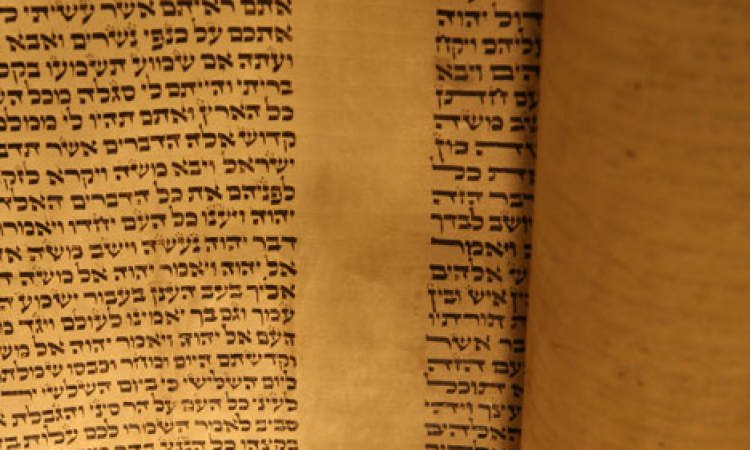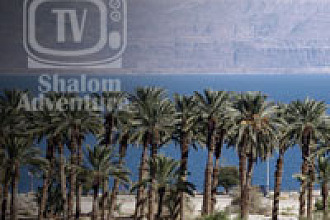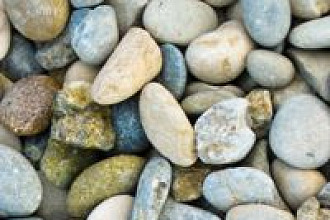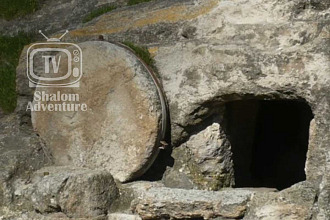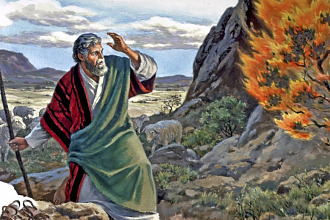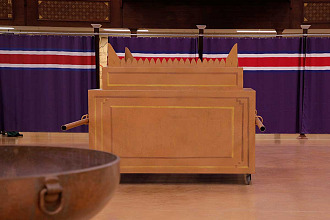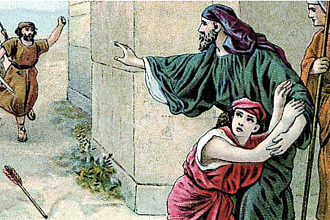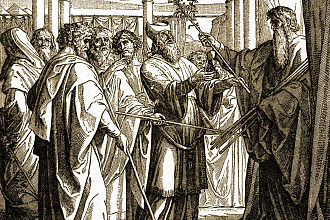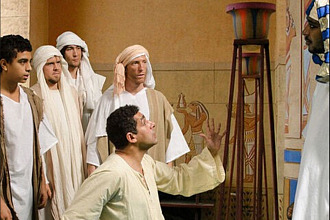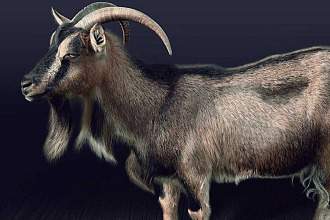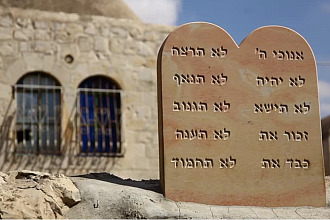Parasha for the Week: Chukat Numbers 19:1 – 22:1
Haftara for the Week: Judges 11:1 - 33
Apostolic Writings: Luke 1:5 - 42
Overview:
The laws of the para aduma (the red heifer) are detailed. These laws are for the ritual purification of one who comes into contact with death. After nearly 40 years in the desert, Miriam dies and is buried at Kadesh.
The people complain about the loss of their water supply that until now has been provided miraculously.
Aharon and Moshe pray for the people’s welfare. G-d commands them to gather the nation at Meribah and speak to a designated rock so that water will flow forth. Dis-tressed by the people’s lack of faith, Moshe hits the rock instead of speaking to it.
He thus fails to produce the intended public demonstration of G-d’s mastery over the world, which would have resulted had the rock produced water merely at Moshe’s word. Therefore, G-d tells Moshe and Aharon that they will not bring the people into the Land.
Bnei Israel resume their travels, but because the King of Edom, a descendant of Esav, denies them passage through his country, they do not travel the most direct route to Eretz Yisrael. When they reach Mount Hor, Aharon dies and his son Eleazar is invested with his priestly garments and responsibilities.
Aharon was beloved by all, and the entire nation mourns him 30 days. Sichon the Amorite attacks Bnei Yisrael when they ask to pass through his land. As a result, Bnei Yisrael conquer the lands that Sichon had previously seized from the Amonites on the east bank of the Jordan River..
"Towards the Promised Land"
As Parashat Chukat begins, the people of Israel have moved away from Mount Sinai and begun their trek to the Promised Land. The path would not be a simple one, for while the desert was relatively uninhabited, and they were therefore generally able to make progress unmolested, they had now left the desert. “The children of Israel, the whole assembly, arrived in the wilderness of Zin in the first month and the people settled in Kadesh.” (Numbers 20:1-2)
Rashi comments that the emphatic phrase, “the whole assembly,” is inserted into the text to let us know that by the time of this encampment all those that had been sentenced to die in the desert had duly passed away, and all those who encamped in the wilderness of Zin belonged to the succeeding generation and would all live to witness the entry into Israel.
Rabbi Noson Weisz says that as part of the transition of the generations, the deaths of the great leaders of the Exodus generation, Miriam and Aaron—as well as the irreversible verdict that condemns Moses to die on the wrong side of the Jordan and is the harbinger of his imminent demise — all appear in our Parasha. The theme of death positively dominates the first part of Chukat.
"The Smitten Rock"
It was not the first time that Moshe faced a angry people of Israel because of lack of water, in Exodus 17 we read that the Rock was already with them, giving them water “So Moses cried out to the L-RD, “What shall I do with this people? They are almost ready to stone me.” The L-RD said to Moses, “Go on ahead of the people, and take some of the elders of Israel with you; take in your hand the staff with which you struck the Nile, and go. I will be standing there in front of you on the rock at Horeb. Strike the rock, and water will come out of it, so that the people may drink.” Moses did so, in the sight of the elders of Israel.” (Ex. 17:4-6). The Bible compare this Rock to G-d, Moshe said “The Rock, his work is perfect, and all his ways are just. A faithful God, without deceit, just and upright is he” (Deut. 32:4). The Brit Hachadasha gives us a very important revelation under the pen of the Shaliach Shaul, he affirmed “and all drank the same spiritual drink. For they drank from the spiritual rock that followed them, and the rock was Mashiach.” (1 Corinthians 10:4). “The smitten rock was a figure of Mashiach, and through this symbol the most precious spiritual truths are taught. As the life-giving waters flowed from the smitten rock, so from Mashiach, ‘smitten of G-d,’ ‘wounded for our transgressions,’ ‘bruised for our iniquities’ (Isaiah 53:4, 5), the stream of salvation flows for a lost race. As the rock had been once smitten, so Mashiach was to be ‘once offered to bear the sins of many.’ (Hebrews 9:28.) Our Saviour was not to be sacrificed a second time; and it is only necessary for those who seek the blessings of His grace to ask in the name of Yeshua, pouring forth the heart’s desire in penitential prayer. Such prayer will bring before the L-rd of hosts the wounds of Yeshua, and then will flow forth afresh the life-giving blood, symbolized by the flowing of the living water for Israel.” [PP411].
“Water Came from the Rock”
The Torah states: “the people argued with Moshe and said, Why have you brought the assembly of the L-rd into this wilderness, to die there, we and our cattle. Why did you make us come out of Egypt to bring us to this bad place. It is not a place of seed, or of figs, or of vines, or of pomegranates; neither is there any water to drink.” In response, G-d told Moshe and Aaron to gather the congregation. Moshe was told to take his staff and speak to the rock before the congregation. It would then give water. Moshe was upset with the people for constantly arguing against G-d. In anger, Moshe called out, “Hear now, you rebels...” Then, instead of speaking to the rock, Moshe hit the rock twice with his staff. The rock gave water, but Moshe and Aaron were punished for not speaking to the rock. G-d told them that as a result, they would not enter the Promised Land.
Haftarah Judges 11:1 - 33
In the text of the parasha we have the story of Israel crossing the Negev and coming to the land of Edom. They ask permission to pass. “Now let us pass through your land” (Num. 20:17). But Edom refused. “You shall not pass through, or we will come out with the sword against you” (Num. 20:18). Israel did not insist and turned back and went around the land of Edom (Num. 21:4).
The same thing happened with the Amorites (Num. 21:21-26). However this time Israel did not accept the refusal of the Amorites and took their land and cities.
The story in our Haftara occurred about three hundred years later, during the time of Jephthah the Gileadite, the son of a prostitute (Judges 11:1). The Amonites came to provoke Israel for what happened during the time of Moses. “After a time the Ammonites made war against Israel” (Judges 11:4). The people of Israel called Jephthah to help them in this situation. Even though Jephthah was not happy, he sent a delegation to the Amonites. “What is there between you and me, that you have come to me to fight in my land?” (Judges 11:12). The king of the Amonites recalled to Jephthah what had happened a few centuries before (Judges 11:26) and pretended that he wanted to get back his original territory, “Because Israel, on coming from Egypt, took away my land from the Arnon to the Jabbok and to the Jordan; now therefore restore it peaceably” (Judges 11:13). However, Jephthah did not want to accept this demand from the Amonites. It was impossible, because the land had been given to the people of Israel by the L-rd himself. “So now the L-RD, the G-d of Israel, has conquered the Amorites for the benefit of his people Israel. Do you intend to take their place? (Judges 11:23). In fact Jephthah asked the Amorites if they wanted to oppose the will of G-d. They had not opposed G-d’s decision for three hundred years; it was better to continue that way if they did not want to be in trouble with G-d. The king of the Ammonites refused. “But the king of the Ammonites did not heed the message that Jephthah sent him” (Judges 11:23). Of course the conclusion is the victory of Israel. It is crucial for us to know whether or not we oppose G-d’s will. Victory is in the hand of G-d, but only if we obey him.
Apostolic Writings Luke 1:5 - 42
This week I have chosen to quote a text from the Besorah of Luke in the Apostolic Writings, this text is at the very beginning of the gospel, “In the days of Herod, king of Judea, there was a priest named Zechariah, of the division of Abijah. And he had a wife from the daughters of Aaron, and her name was Elizabeth. And they were both righteous before G-d, walking blamelessly in all the commandments and statutes of the L-rd. But they had no child, because Elizabeth was barren, and both were advanced in years.” (Luke 1:5–7). What connexion do we have between this text and the parasha for this week, Chukat? The mention of Aaron. In the parasha there are several mentions of Aaron, the brother of Moses. As I already said this para-sha is a sad one for Moses and his family, since both of them Aaron and Myriam who were older than Moses died. Myriam died in Kadesh. However, Aaron’s passing away is presented in a special way, G-d spoke to Moses and said to him: “'Take Aaron and Eleazar his son and bring them up to Mount Hor. And strip Aaron of his garments and put them on Eleazar his son. And Aaron shall be gathered to his people and shall die there.' Moses did as the L-RD commanded. And they went up Mount Hor in the sight of all the congregation. And Moses stripped Aaron of his garments and put them on Eleazar his son. And Aaron died there on the top of the mountain. Then Moses and Eleazar came down from the mountain. And when all the congregation saw that Aaron had perished, all the house of Israel wept for Aaron thirty days.” (Numbers 20:25ذ29). Aaron died at the Mount Hor, this is not in the land of Israel, they were still traveling when Aaron died. In fact, both of them, Moses and Aaron died in what is called today Jordan. On the east side of the Jordan river and Dead Sea, If we don’t know the exact burring place of Moses, just that it was on mount Nebo, we know exactly the place where Aaron died and was burred. It is very close to the place known as Petra. I have been there several times, and every time I go to Petra, I make a stop on Mount Hor, to see the tomb of Aaron.
I have chosen this text of Luke because Aaron is mentioned there as the ancestor of Zechariah and his wife Elizabeth. In the biblical genealogy the father counts, that is why Zechariah, as a descendant of Aaron, was a priest, “of the division of Abijah.” We know that the priests who were too many at that time were divided in twenty four classes, and each class was in duty in Jerusalem fifteen day a year, the rest of the time, they were ministering the Jewish people in their cities and villages. Zechariah was certainly from an important family, not a simple priest or levite, he was chosen to enter the Holy place of the Temple to offer the incense to G-d, “while he was serving as priest before G-d when his division was on duty, according to the custom of the priesthood, he was chosen by lot to enter the temple of the L-rd and burn incense” (Luke 1:8–9).
According to the tradition, the living place of Zachariah and Elizabeth was among the hills of Judah, Ein Kerem, today a suburb of Jerusalem, where the greatest hospital of Israel, Hadassah, is located. Then, Zechariah was a priest, but the text says that Elizabeth was also a “daughters of Aaron” that means both of the them were descendants of Aaron. The gospel gives the story of this couple, because they will have a child, who will be Yochanan HaMatbil, known as John the Baptist. And the special point of this story is that Elizabeth was a relative to Myriam the mother of Yeshua. The narrative says that when the angel Gabriel announced to Myriam that she will be pregnant and will give birth to Yeshua, he also said to her: “And behold, your relative Elizabeth in her old age has also conceived a son, and this is the sixth month with her who was called barren.” (Luke 1:36). That is why as soon as she could she visited Zechariah and Elizabeth: “In those days Mary arose and went with haste into the hill country, to a town in Judah, and she entered the house of Zechariah and greeted Elizabeth. And when Elizabeth heard the greeting of Mary, the baby leaped in her womb. And Elizabeth was filled with the Holy Spirit, and she exclaimed with a loud cry, ‘Blessed are you among women, and blessed is the fruit of your womb’!” (Luke 1:39–42). This text is interesting in order to know who is Yeshua, since Myriam was a relative of Zechariah and Elizabeth, this suggests that Myriam and then Yeshua were related to Aaron the high priest. Of course the letter to the Hebrews says: “Now if he were on earth, he would not be a priest at all,” (Hebrews 8:4) this because only the father counts, even though his mother was related to Aaron, and the tribe of the priests he could not be a priest. The text of Hebrews adds: “For it is evident that our L-rd was descended from Judah, and in connection with that tribe Moses said nothing about priests.” (Hebrews 7:14), all the genealogy of Yeshua point to Judah and David, that is why the Jews of Jerusalem cheer him as the "Son of David" (Matthew 21:15).

